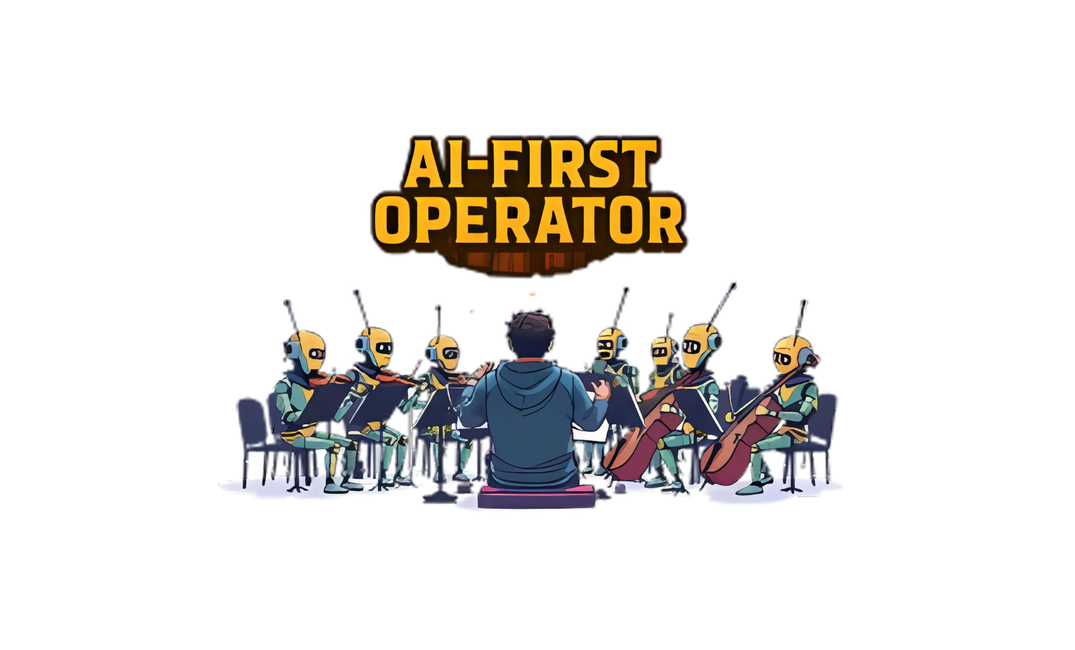Twenty-five years ago Google made facts cheap. So we pivoted to skill, polishing CVs with coding bootcamps and “ninja” certificates—right up until large‑language models began writing passable Python in less time than it takes to microwave my lunch.
What’s left for humans in a world where both knowing and doing can be outsourced to machines?
After teaching technical skills to thousands of people, the answer seems to be wisdom.
Swift, but informed judgment.
The art of deciding when to lean on AI, which tool to enlist, and, most delicately, why. It sounds esoteric, yet it has become the most practical question in modern work.
Ignore it and you risk falling behind people who ship in days what once required quarters. Embrace it too much and you end up adding to the sea of slop that's polluting the internet.
But when you find the balance, you find yourself in a new career lane:
You become an AI‑First Operator.
The Collapse of Scarcity
In 1969, a lone programmer could stare at a punch‑card deck and feel irreplaceable. Half a century later, a high‑school student armed with Perplexity Deep Research can summon a market briefing that would make a McKinsey partner blush.
Information is no longer a moat; it’s a public utility and skill is following the same trajectory.
Open Claude Desktop, describe the shape of your ideal workflow in plain English, and its n8n MCP node will obligingly wire APIs together. Clients like Cursor are being upgraded with new libraries of capability, like Jentic and their knowledge layer OAK.
Building a website with Lovable makes Webflow feel like Win98.
These new tools sing of a world where daily business activities are completed by agents, orchestrated through simple chat clients. The first people in the audience are the AI-First Operators. Not trusting the machine blindly, but leveraging its skills.
The frontier between human and machine remains jagged (as Ethan Mollick coined it) and those who can map and navigate that frontier confidently are the builders of tomorrow.
Parkinson’s Law, Reimagined
Cyril Northcote Parkinson observed that work expands to fill the time available; When you build automations for a living, you experience the modern corollary:
Automation contracts work to fit the nerve we have to set tight deadlines.
Tell a conventional project team to build a voice assistant and they will ask for Gantt charts and six‑figure budgets. Give a savvy operator 48 hours, and she will squeeze the timeline until only the essential remains—then outsource half of that to LLM agents.
Urgency, once a project‑management gimmick, is now a design principle. Compress the schedule and you expose the shortcuts worth taking; pair those shortcuts with AI acceleration and you create momentum that money can’t buy.
“Jesus Christ David, how much free time do you have?“
My boss asked me this question this week when I showed him the things I've been building in my free time. When I told him how much time it took me to build them, I was met with utter disbelief.
Becoming an AI-First Operator doesn’t mean upskilling. It means redefining what it means to work.
Artificial Co-Intelligence
AI-First Operators are outliers in the corporate. They have incredible agency thanks to their momentum. Spend an afternoon with a modern operator and you will notice an almost theatrical division of labour. Anything that smells of processing—data collection, clustering, summarising—goes straight to silicon.
Anything that hinges on consequence—strategy, ethics, narrative—stays with the human. Even here AI has a place, but only as a mental sparring partner. The core reason is trivial: you can't make software accountable.
Critics worry this leads to shallow thinking: “If AI writes the first draft, won’t we forget how to write?” The reality is subtler. By renting ten minutes of an LLM’s associative firepower you free an hour of your own focus for synthesis.
This allows you to redirect your mental effort to where you can make the biggest impact. AI-First Operators don’t use LLMs for shallow thinking. They use it to challenges themselves to thinking with intent.
You may write fewer raw sentences, but the sentences you do write carry disproportionate weight. This is what Mollick envisioned in Co-Intelligence.
The Operator Stack
AI-First Operators demand their own tech stack. Which is why in most corporates there is very little AI adoption on the surface, but in reality, shadow IT is dominated by ChatGPT and the like.
The AI-First Operator Stack adds a layer on top of the existing one, dominated by agentic behavior:
- Perplexity Deep Research for instant, source‑linked dossiers.
- Lovable for prototyping, website design or database actions.
- Cursor (which can be used for so many things other than coding!) to generate documents, write code or operate tools via chat thanks to MCP servers.
- n8n or Make as the glue—when you find a workflow that works, you stitch it together to make it reusable.
- Supabase to host all your data in a central location where its embedded AI assistant can manage your database for you.
- AlfredOS to replace your SaaS bill with an army of self-hosted free apps.
Owning this arsenal is less important than knowing when to use each weapon. That judgment is lonelier than it sounds: no dashboard flashes when you choose the right blend of human instinct and machine throughput. Only the after‑action results—weeks shaved off a product launch, budgets spared, competitors blindsided—bear silent witness.
Value is Moving Upstream
The first wave of digital power users automated spreadsheets; the next will orchestrate fleets of agents. Your advantage will not come from typing the perfect prompt but from deciding the last prompt worth typing.
It will come from wielding Parkinson’s Law without breaking teams, from mapping the jagged frontier before breakfast, from refusing to hoard knowledge when a briefing link suffices.
Become an AI-First Operator
If you’d rather not stumble alone through the jagged frontier, I teach an AI‑First Operator Bootcamp.
Twelve weeks of live workshops and agent‑building sprints designed to compress years of trial‑and‑error into a single season.
We spend one track mastering the technical stack (n8n, MCP, Claude Desktop, Supabase), and another building the automations you already need.
Prices go up in two weeks, the first cohort kicks off 2 July 2025. If you’re ready to turn urgency into momentum and software into silent colleagues, grab a seat here.
If that sounds daunting, start small. Record a two‑minute voice rant about a project that scares you. Let AI transcribe it, organise it, and outline it in the Pyramid Principle. Spend the time you saved refining the argument, adding the context no dataset captures. Deliver Monday. Then your leverage.
My wife asked me yesterday to help her figure out how to use ChatGPT to build her coaching practice. I told her the same thing. I said:
"When you have an idea, share it with ChatGPT. It may be sycophantic but that will be an advantage to enable your creativity to flow freely."
Today as I was driving home from a full day AI workshop I did for a client in Hungary, I gave her a ring.
"What's up?" - I asked.
"Oh everything's great! I just created an entire workbook for my upcoming session on our current topic with my client." - her voice was energetic. I don’t think I’ve ever seen her getting excited about a piece of technology. - "I know I've been putting this off for long, but I think we're off to a good start. Without ChatGPT it would've taken me hours or days to make this workbook."
In a few years we may look back at 2025 as the moment wisdom became a quantifiable asset. By then, knowledge and skill will be rented so cheaply that résumés listing them will feel quaint. What will matter is the discernment you exercise while everyone else scrolls through an infinite buffet of capabilities.


